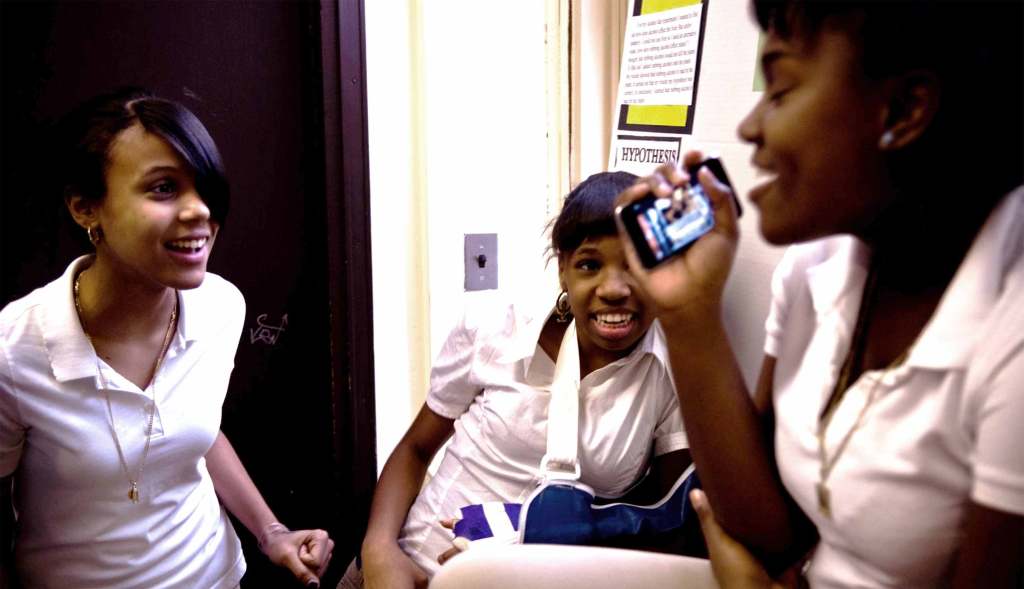
Black girls make up only 16 percent of female students but more than one-third of all girls with a school-related arrest. Compared with their white counterparts, black girls disproportionately face corporal punishment, suspensions, expulsions, and other forms of exclusionary discipline. In her new book, Pushout: The Criminalization of Black Girls in Schools, author and advocate Monique Morris highlights the experiences of these girls and shows how stereotypes and stigma make black female students vulnerable to misunderstandings and mistreatment.
I recently spoke to Morris about her book, why female students of color are pushed out of schools and into unstable and often unsafe futures, and what we can do to break the cycle of marginalization and criminalization. Below are highlights from that conversation.
Girls of color face disproportionate punishment
Data show that black girls are overrepresented across the entire discipline spectrum—meaning that they are much more likely to be punished, suspended, or expelled from school than their white classmates. This doesn’t mean they are the only girls getting in trouble, just that they are disproportionately punished for it.
On YouTube, vivid examples of unnecessary force and discipline abound—including footage of Shakara, a 16-year-old in South Carolina who was pummeled to the ground and dragged out of class by a “school resource officer” for using her cell phone in class. This type of forceful punishment has devastating effects on the academic, social, and emotional well-being of the girls being punished, as well as on their peers who witness these minor infractions being met with excess force.
Accessibility Statement
- All videos produced by the Ford Foundation since 2020 include captions and downloadable transcripts. For videos where visuals require additional understanding, we offer audio-described versions.
- We are continuing to make videos produced prior to 2020 accessible.
- Videos from third-party sources (those not produced by the Ford Foundation) may not have captions, accessible transcripts, or audio descriptions.
- To improve accessibility beyond our site, we’ve created a free video accessibility WordPress plug-in.
We need a better understanding of how black girls enter the criminal justice system
As she conducted research for her book, Morris talked to girls from a range of backgrounds about their experiences in school and traced their path to entering the juvenile legal system. It became clear to her that people in a position to help these girls rarely asked them about their experiences in school. It was also clear that girls’ experiences were vastly different from those of boys of color. Morris points out that because our understanding of the “school-to-prison pipeline” is largely based on the experiences of boys, it is of limited use when it comes to understanding the situations girls are in.
Accessibility Statement
- All videos produced by the Ford Foundation since 2020 include captions and downloadable transcripts. For videos where visuals require additional understanding, we offer audio-described versions.
- We are continuing to make videos produced prior to 2020 accessible.
- Videos from third-party sources (those not produced by the Ford Foundation) may not have captions, accessible transcripts, or audio descriptions.
- To improve accessibility beyond our site, we’ve created a free video accessibility WordPress plug-in.
Let’s focus on protecting students, not punishing them
Our current system often fails to protect girls, especially girls of color. To avoid this, some girls decided to skip school—only to be marked truant and punished accordingly.
In Pushout, Morris highlights the stories of girls who have been abused and sexually exploited—and rather than being counseled and protected, are punished for “acting out.” The use of police officers in schools (often referred to as school resource officers) is also a problem. In the absence of protocol or training about how to recognize and address the issues students they face, officers too often use unnecessary force.
To create systems that protect girls of color instead of criminalizing them, we need to listen to their experiences and let them tell us what they need. Schools should strive to recognize the challenges their students are facing and work to help them, rather than jumping to conclusions, heaping on punishment, and adding to their burdens.
Accessibility Statement
- All videos produced by the Ford Foundation since 2020 include captions and downloadable transcripts. For videos where visuals require additional understanding, we offer audio-described versions.
- We are continuing to make videos produced prior to 2020 accessible.
- Videos from third-party sources (those not produced by the Ford Foundation) may not have captions, accessible transcripts, or audio descriptions.
- To improve accessibility beyond our site, we’ve created a free video accessibility WordPress plug-in.
Listen to black girls, and take them seriously
At least officially, America loves to celebrate black women who speak up and speak out against injustice. Each year during Black History Month, we praise women like Harriet Tubman and Rosa Parks for their rebellious contributions to freedom and justice. At the same time, these celebrations tend to neglect women like Claudette Colvin, whose pioneering efforts in the Montgomery bus boycotts were obscured because she was considered too “feisty,” “mouthy,” and openly confrontational.
Likewise in schools: Instead of being valued for their potential to further a conversation, the contributions of black girls are too often dismissed as “sassy,” “rude,” or an affront to authority. They are scolded or disciplined for being “out of line” instead of being listened to and taken seriously.
Accessibility Statement
- All videos produced by the Ford Foundation since 2020 include captions and downloadable transcripts. For videos where visuals require additional understanding, we offer audio-described versions.
- We are continuing to make videos produced prior to 2020 accessible.
- Videos from third-party sources (those not produced by the Ford Foundation) may not have captions, accessible transcripts, or audio descriptions.
- To improve accessibility beyond our site, we’ve created a free video accessibility WordPress plug-in.
Black girls’ lives matter
The African American Policy Forum found that when asked about the education and juvenile legal system, girls overwhelmingly talked about the experiences of the boys in their lives, rather than talking about their own experiences. This is a reflection of how girls are taught to minimize their own pain and measure their value mostly as it aligns with their roles as wives, sisters, and mothers.
To be empowered, girls of color need to feel that they are recognized as valuable assets to society. To create systems that truly support these girls and women, we must celebrate their worth as independent people with their own value to contribute.
Accessibility Statement
- All videos produced by the Ford Foundation since 2020 include captions and downloadable transcripts. For videos where visuals require additional understanding, we offer audio-described versions.
- We are continuing to make videos produced prior to 2020 accessible.
- Videos from third-party sources (those not produced by the Ford Foundation) may not have captions, accessible transcripts, or audio descriptions.
- To improve accessibility beyond our site, we’ve created a free video accessibility WordPress plug-in.
Watch the full conversation with Monique Morris:
Accessibility Statement
- All videos produced by the Ford Foundation since 2020 include captions and downloadable transcripts. For videos where visuals require additional understanding, we offer audio-described versions.
- We are continuing to make videos produced prior to 2020 accessible.
- Videos from third-party sources (those not produced by the Ford Foundation) may not have captions, accessible transcripts, or audio descriptions.
- To improve accessibility beyond our site, we’ve created a free video accessibility WordPress plug-in.
